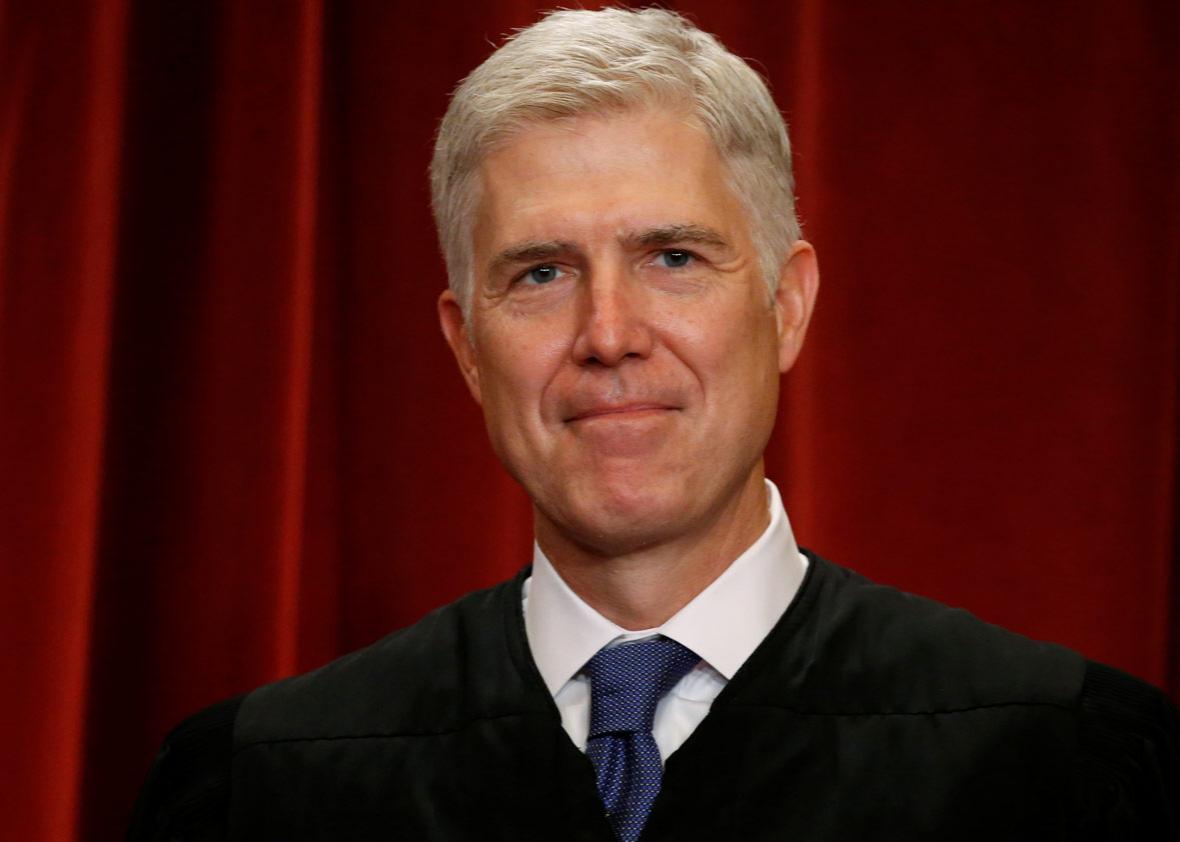On Tuesday, the Supreme Court heard arguments in Masterpiece Cakeshop v. Colorado Civil Rights Commission, a case that centers on an anti-gay baker in Colorado who claims a First Amendment right to ignore state law and refuse service to same-sex couples. A key issue in Masterpiece is just how far the court’s conservative justices are willing to go in subverting civil rights law to protect the freedom to discriminate. And during Tuesday’s arguments, Justice Neil Gorsuch proposed a radical new theory that could fatally undermine legal protections for minorities in all 50 states.
Gorsuch’s startling proposal arrived midway through arguments, as Colorado Solicitor General Frederick Yarger defended the state’s civil rights commission. Yarger was attempting to explain why Colorado’s treatment of Jack Phillips, the baker, did not run afoul of his rights to free speech or free exercise of religion. Gorsuch jumped in with “a quick question about the remedy” that Colorado imposed on Phillips after finding that he had violated state nondiscrimination law.
Gorsuch, with a look of grave concern, said:
As I understand it, Colorado ordered Mr. Phillips to provide comprehensive training to his staff, and it didn’t order him to attend a class of the government’s own creation or anything like that, but to provide comprehensive staff training.
Why isn’t that compelled speech and possibly in violation of his free-exercise rights? Because presumably he has to tell his staff, including his family members, that his Christian beliefs are discriminatory.
Yarger, who seemed befuddled by the question, responded honestly, telling Gorsuch that “a training requirement is a common remedy that is used in many civil rights cases.” The justice, however, pressed on.
“But this isn’t attending your training, Mr. Yarger,” Gorsuch said. “This order was ordering him to provide training and presumably compelling him to speak, therefore, and to speak in ways that maybe offend his religion and certainly compel him to speak.”
By this point, Yarger looked genuinely alarmed. And rightfully so: Gorsuch had essentially declared that a law which requires managers to teach their employees about the requirements of nondiscrimination law violates the First Amendment. If that’s true, then a wide range of civil rights law is at least partly unconstitutional. Many of these statutes obligate employers to inform workers of their duties under state and federal law. That includes training on discrimination: Supervisors must instruct employees not to engage in harassment, unlawful refusal of service, and a broad range of identity-based mistreatment.
The courts have long held that the government can prohibit this kind of discrimination in a professional environment—and require private employers to enforce these prohibitions—consistent with the First Amendment. Civil rights laws impose only an incidental burden on expression; their purpose is to guarantee equality in public accommodations and the workplace, not to censor speech. The government is not constitutionally precluded from forcing businesses to maintain policies of fairness and inclusion simply because these rules may compel or suppress expression in a commercial setting.
Gorsuch’s theory would hobble this nondiscrimination regime by preventing the government from directing employers to tell employees about their rights and responsibilities under law. And for good reason: A hotel supervisor who believes that interracial relationships are sinful could refuse to tell her employees that they must let mixed couples book rooms. A restaurant manager with spiritual objections to interfaith marriage could decline to train her employees in their legal duty to serve customers without regard to religion. According to Gorsuch, these employers hold a First Amendment right not “to speak in ways that maybe offend [their] religion.” Thus, they must be excused from telling their employees about civil rights law to which they object.
This same exemption would almost certainly apply in the employment discrimination context as well as in public accommodations. Currently, supervisors open themselves to liability when they fail to educate employees about legal proscriptions on discrimination, including harassment. Gorsuch’s rule would let supervisors ignore these requirements if explaining them would violate their sincerely held beliefs. A manager with misogynistic religious views could therefore refuse to instruct employees to treat their female colleagues equally, citing his beliefs about women’s inferiority. After all, under Gorsuch’s framework, the law is “compel[ling] him to speak” in contravention of his conscience.
As Yarger promptly explained to Gorsuch, this vision of Phillips’ obligation under Colorado law grossly overestimates the burden imposed upon his freedom of speech. “All that is required in these training sessions,” Yarger said, “is a demonstrated understanding of the Colorado Anti-Discrimination Act. It has nothing to do with a particular person’s belief. It has to do with ensuring that the conduct that was found discriminatory.” But that response did not please Justice Anthony Kennedy.
“Part of that speech,” Kennedy asserted, “is that state law, in this case, supersedes our religious beliefs, and he has to teach that to his family. He has to speak about that to his family … who are the employees.”
Finally, Justice Ruth Bader Ginsburg jumped in to save Yarger, telling him: “His belief is his belief. All he has to instruct [his family] is this is what the law of Colorado requires.”
Yet neither Gorsuch nor Kennedy appeared to be appeased. Both justices still seemed to think that Colorado had forced Phillips to spew state propaganda to his family by directing him to implement a nondiscrimination policy. Gorsuch, in particular, gave the impression that he views basic training in civil rights law as a violation of employers’ First Amendment rights. If the court adopts his theory—and it could, given Kennedy’s apparent support—it would not merely undercut LGBTQ protections. Its decision could also sabotage the nondiscrimination protections that have governed American businesses for decades, handing religious employers a tool to flout civil rights law in the name of free speech.
